Related Research Articles
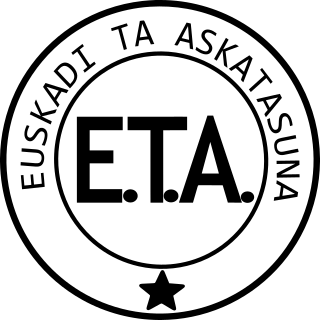
ETA, an acronym for Euskadi Ta Askatasuna, was an armed Basque nationalist and far-left separatist organization in the Basque Country between 1959 and 2018, with its goal being independence for the region. The group was founded in 1959 during the era of Francoist Spain, and later evolved from a pacifist group promoting traditional Basque culture to a violent paramilitary group. It engaged in a campaign of bombings, assassinations, and kidnappings throughout Spain and especially the Southern Basque Country against the regime, which was highly centralised and hostile to the expression of non-Castilian minority identities. ETA was the main group within the Basque National Liberation Movement and was the most important Basque participant in the Basque conflict.
Batasuna was a Basque nationalist political party. Based mainly in Spain, it was banned in 2003, after a court ruling declared proven that the party was financing ETA with public money.
Fernando Buesa Blanco was a Spanish politician in the Basque Christian Democracy and in the Socialist Party of the Basque Country–Basque Country Left (PSE-EE) branch of the social democratic Spanish Socialist Workers' Party (PSOE). He was assassinated by ETA.
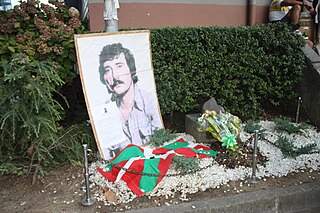
GAL were death squads illegally established by officials of the Spanish government during the Basque conflict to fight against ETA, the principal Basque separatist militant group. They were active from 1983 to 1987 under Spanish Socialist Workers' Party (PSOE)-led governments.
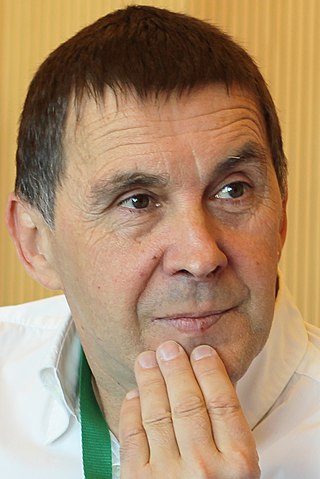
Arnaldo Otegi Mondragón is a politician from the Basque Country who has been the General Secretary of Basque nationalist party EH Bildu since 2017. He was member of the Basque Parliament for both Herri Batasuna and Euskal Herritarrok. He was a convicted member of the ETA, a banned armed separatist group organization, in his early years. He was one of the key negotiators during the unsuccessful peace talks in Loiola and Geneva, in 2006.
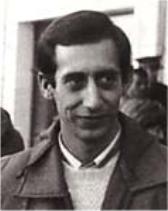
José Miguel Beñaran Ordeñana was a Basque militant and a key figure in the political evolution of the Basque separatist organization Euskadi ta Askatasuna (ETA). Often known by his nom de guerreArgala (Slim), he took part in the so called Operation Ogre, which consisted in the assassination of Luis Carrero Blanco, Spain's Prime Minister, in 1973. Five years later, he was in turn assassinated by a car bomb in Anglet, French Basque Country, by a group directed by far right members inside the Spanish Navy. This group reportedly received assistance from people such as former OAS member Jean Pierre Cherid, former Triple A Argentine member José María Boccardo and Italian neofascist Mario Ricci, member of Avanguardia Nazionale.

The Communist Party of the Basque Homelands was a communist Basque separatist party in the Basque Country, Spain. The party was outlawed by the Spanish Supreme Court in 2008 after it was judicially proven to be part of Batasuna and, therefore, ETA.

Egunkaria for thirteen years was the only fully Basque language newspaper in circulation until it was closed down on 20 February 2003 by the Spanish authorities due to allegations of an illegal association with ETA, the armed Basque separatist group. After seven years, on 15 April 2010 the defendants were acquitted on all charges related to ties to ETA. The issue of damages for the closure of the newspaper remains open, as well as the alleged torture of the members of the newspaper's executive board during detention.

Lemóniz Nuclear Power Plant is an unfinished nuclear power plant in Lemoiz, in the Basque province of Bizkaia, Spain. Its construction stopped in 1983 when the Spanish nuclear power expansion program was cancelled following a change of government. Its two PWRs, each of 900 MWe, were almost complete but were never operated.
El Correo is a leading daily newspaper in Bilbao and the Basque Country of northern Spain. It is among best-selling general interest newspapers in Spain.
Javier de Ybarra y Bergé was a Basque industrialist, writer, and politician from Bilbao.

The Basque conflict, also known as the Spain–ETA conflict, was an armed and political conflict fought from 1959 to 2011 by the Basque National Liberation Movement, a group of Basque nationalist organizations which sought independence for the Basque Country, against Spain and France through various social, political, and terrorist means. The movement was largely built around Euskadi Ta Askatasuna (ETA), a terrorist organization which launched a campaign of attacks against Spanish administrations from 1959 onwards. ETA was proscribed as a terrorist organization by the Spanish, British, French and American authorities at different moments.
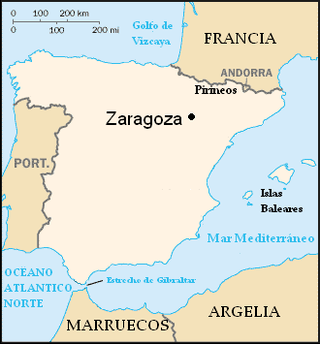
A car bomb attack was carried out by the Basque separatist organisation ETA on 11 December 1987. A vehicle containing 250 kilograms (550 lb) of ammonal was parked beside the main Guardia Civil barracks in the city of Zaragoza, Aragon, Spain; its explosion killed 11 people, including 5 children. Another 88 people were injured, the majority of them civilians.

Gonzalo Boye Tuset is a lawyer based in Spain, known for being convicted in connection with a kidnapping by Basque separatist group ETA in 1996, and for attempting to charge members of the George W. Bush administration officials for war crimes committed against Spanish citizens. In recent years, he has often been in the media spotlight as lawyer of former Catalan President Carles Puigdemont, who he successfully defended against extradition from several EU countries to Spain.
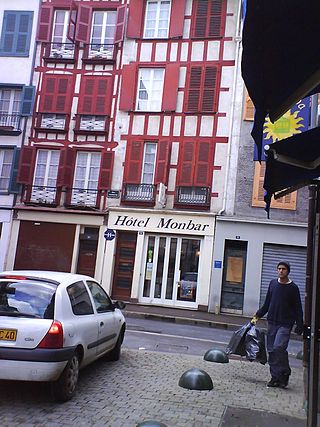
The Monbar Hotel attack was carried out by the Grupos Antiterroristas de Liberación (GAL), a Spanish state-sponsored death squad, on 25 September 1985 in Bayonne, Pyrénées-Atlantiques, France. The targets were four members of the Basque separatist terrorist group Euskadi Ta Askatasuna (ETA), whom the Spanish government believed to be senior figures in the organization, itself proscribed as a terrorist group in Spain and France. All four people were killed, with a fifth person, apparently unconnected to ETA, injured in the shooting. This represented the deadliest attack carried out by the GAL. Although two of the participants were apprehended shortly after the shooting, controversy surrounded the possible involvement of senior figures in the Spanish police.
The assassination of Augusto Unceta Barrenechea was an attack by the Basque separatist group ETA which took place on 8 October 1977 in Guernica in the Basque Country in northern Spain.
David Pla Marín is a lawyer and Basque activist, who Spanish authorities believe to have been one of the three leaders of the Basque separatist group ETA at the time of the group's ceasefire declaration in October 2011. In 2000 Pla was condemned to six years imprisonment for planning an attack against the Mayor of Zaragoza, José Atarés. Pla is believed to be one of three people who read out the October 2011 ETA ceasefire declaration. He had previously been the leader of Basque separatist youth organisation Jarrai in the 1990s and had stood unsuccessfully as a candidate for Herri Batasuna in the 1995 local elections.

Etxerat is an association of family members of people who have been imprisoned or exiled because of their activity in support of the Basque National Liberation Movement. Most of those prisoners and exiles are members, or former members, of the Basque armed separatist organization ETA. Others were not members of ETA but have been jailed for collaborating with it, or have been convicted of other crimes such as belonging to illegal organizations like SEGI or Gestoras pro Amnistía, belonging to or trying to rebuild banned political parties such as Batasuna and Askatasuna, participating in Kale borroka, or for the "public glorification of terrorism". Etxerat's primary activities are to support those family members, and to campaign to defend the rights of their imprisoned and exiled relatives.

The Burgos trials were a series of military tribunals held in the Spanish city of Burgos from 3 to 9 December 1970. The trials prosecuted 16 members of the Basque separatist organisation Euskadi Ta Askatasuna (ETA) for their involvement in two murders of police officers in 1968. Causing international outrage and sympathy for the defendants, the trials are best known for six death sentences handed out by the tribunals which were later commuted to lengthy prison spells.
References
- 1 2 Andrew Hurst (1988-10-31). "Basques free hostage in slap at Spanish reign". Houston Chronicle. p. a10. Archived from the original on May 25, 2024. Retrieved 2011-11-19.
The boldness with which the Basque separatist terrorists released Revilla in the heart of the capital, after holding him for eight months in Spain's longest politically motivated kidnapping, appeared calculated to demonstrate ETA's strength and to embarrass the government.
- 1 2 Emma Roig (1988-02-25). "Secuestrado en Madrid, en el portal de su domicilio, el empresario Emiliano Revilla" [Kidnapped in Madrid, on the porch of his home, businessman Emiliano Revilla: Four individuals forced him into a car while returning from his office]. Periódico El País. Archived from the original on January 22, 2015. Retrieved 2011-11-19.
- 1 2 "FUE CONDENADO POR COLABORAR CON ETA: Gonzalo Boyé está detrás de la querella contra el ex ministro de Defensa israelí" [He was convicted of collaborating with ETA: Gonzalo Boye behind the lawsuit against former Israeli Defense Minister]. Libertad Digital Internacional. 2009-01-30. Archived from the original on January 30, 2012. Retrieved 2011-11-19.
- ↑ Emma Roig (1988-10-30). "La presión policial provocó la negociación más larga" [The police pressure caused the longest negotiation: The Government shall at all times keep the ransom money were to ETA]. Periódico El País. Archived from the original on January 22, 2015. Retrieved 2011-11-19.
- 1 2 "An ETA kidnap victim turns to art". Typically Spanish. 2008-03-24. Archived from the original on 2010-09-22. Retrieved 2011-11-19.
All the work on show was produced in 1988, at a time when Revilla had never drawn or painted before – at least, not since his childhood – and 17 years later he was persuaded to exhibit them by the local Town Hall.
{{cite news}}: CS1 maint: bot: original URL status unknown (link) - ↑ Paul Delaney (1988-11-03). "Left in Spain Is in Disarray; So Is the Right". New York Times . Archived from the original on January 22, 2015. Retrieved 2011-11-19.
As if to rub it in, the kidnappers released Mr. Revilla Sunday within sight of his apartment. For months, the police conducted raids and roadblocks with no success.